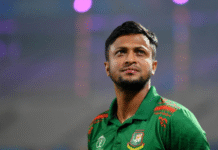
Shakib and Mustafiz excelled as individuals in this World Cup.
Almost 24 hours after seeing the World Cup getting decided by the number of boundaries hit at the end of arguably the greatest ever ODI game, everyone is dishing out their respective Teams of the Tournament. We are no exception and thankfully for the readers, ours is a little different than the team ICC had ealrier named on the day.Rohit Sharma (India)
Five centuries in a single World Cup sounds unbelievable, but Rohit has done that with embarrassing ease. He is the highest scorer in this edition of the World Cup with 648 runs made at an average of 81.00, so he had to be an automatic choice to be the opener of this team.

David Warner (Australia)
The left-handed batsman made the perfect comeback after being banned from the game for almost a year. His three centuries and three fifties proved vital for the former champions’ run to the last four. With 647 runs scored at an average of 71.88, Warner was the tournament’s second highest run getter and he gets to open in this team alongside Rohit. It was a close call between Warner and Jason Roy (443 runs at an average of 63.28), but in the end the Australian got the nod.
Kane Williamson (Captain, New Zealand)
Although he did not lift the trophy in Lord’s on Sunday, few would argue that the Kiwi was the best captain over the last one and half months. The Player-of-the-Tournament not only made 578 runs at a stunning average of 82.57, but his cool head, field placement and bowling change were also at their best to lead his side to the final and within touching distance of the trophy.
Babar Azam (Pakistan)
Well this may raise a few eyebrows but the Pakistan top-order batsman takes the spot for this team’s fourth specialist batsman at the expense of Joe Root. Babar has made 474 runs playing 8 games, averaging 67.71 while Root scored 556 in 11 matches with an average of 61.77. But the Pakistani’s record against the top five teams (242 at an average of 80.67) is better than that of Root (239 in 6 games including the semifinal and the final at an average of 39.83) and that books his place in the team.
Shakib Al Hasan (Bangladesh)
It was a shame Bangladesh finished eighth in the World Cup, but what a tournament the Tigers all-rounder had! Playing eight matches, the Bangladesh ace scored 606 runs at a staggering average of 86.57 (also the best in the tournament) and bagged 11 wickets. He batted at three for his side, but the inclusion of Williamson and Babar means he has to bat at five here.

Ben Stokes (England)
The Man-of-the-Final hit five half centuries to make 465 runs at an average of 66.42 besides grabbing five wickets to lead the Three Lions to their first ever title. But the stats do not say how he kept his cool in difficult times, which on many occasions, including the final, made the difference. In a team that has four specialist batsman and four specialist bowlers, the all-rounder duo of Shakib and Stokes bring in the perfect balance.
Alex Carey (Wicketkeeper, Australia)
Many say he is the find of this tournament and they are probably right. The wicketkeeper-batsman hit 375 runs in 10 games at an average of 62.50 besides recording 20 dismissals, which is only bettered by New Zealand’s Tom Latham, who has 21.
Mitchell Starc (Australia)
Last World Cup’s Player-of-the-Tournament set a new record this time by claiming 27 wickets, the highest for a bowler in a single edition. Starc grabbed five wickets twice and a four-for on another two occasions, and his average was also remarkable, just 18.59. Ultimate choice, no debate.

Lockie Ferguson (New Zealand)
The Kiwi pacer ended the tournament with 21 wickets, the second highest, claimed at an extraordinary average of 19.47. Ferguson and Starc are the only two bowlers who have taken at least one wicket in all the games they have played in this tournament.
Jofra Archer (England)
Born in the Caribbean yet now playing for the Three Lions, Archer is the tournament’s third highest wicket-taker, with 20 scalps. He played a crucial role in England’s road to the final and also bowled the decisive Super Over. He did concede a six to James Neesham, but restricting them to two runs in two balls was just an example of his calibre, which in the end won England the trophy.
Mustafizur Rahman (Bangladesh)
Another surprise inclusion, one might say. It was a battle between Mustafiz and Jasprit Bumrah, but the Satkhira Cyanide edged his fellow Indian on a number of grounds. He has 20 wickets to Bumrah’s 18, despite playing a game less. Bumrah’s average is better than Mustafiz, but the latter claimed two five-fors and fared better than the former against teams that finished in the top five (12 to 5).
Source: Prothom Alo.









